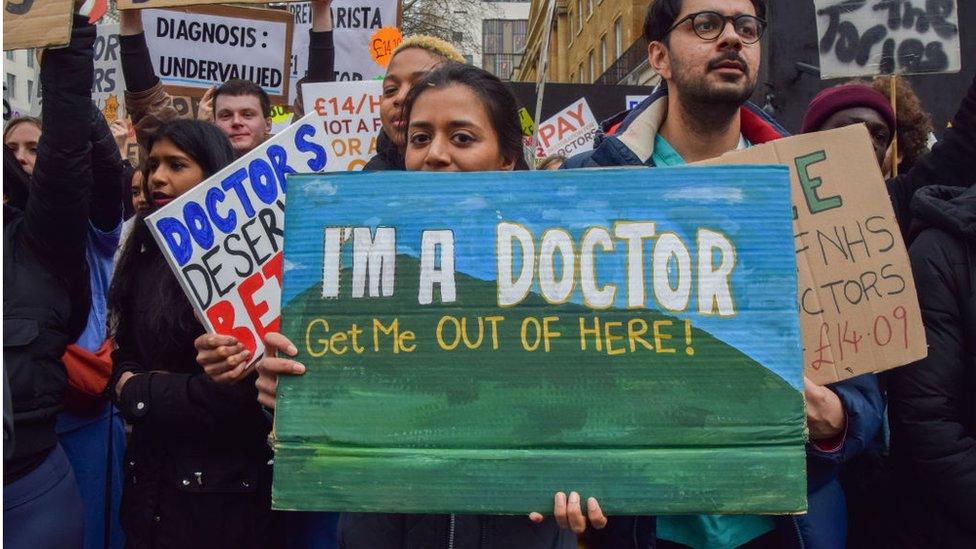Four-day junior doctors strike begins
- Published
- comments

Many junior doctors in England have been taking part in strikes over pay and working conditions
Some big disruptions to the NHS are expected this week.
It's because junior doctors across England are taking part in a four-day strike which begins today.
The strike action, organised by the British Medical Association (BMA) which represents doctors and medical students in the UK, is happening because of arguments over their pay and working conditions.
It follows a three-day strike which took place last month and it's estimated between 250,000 and 350,000 hospital appointments, including operations, could be cancelled.
The government says the doctors' demands are "unreasonable".
Why are junior doctors striking?
Junior doctors make up more than 40% of the medical workforce
Lots of junior doctors in England are striking over their current pay.
The BMA says junior doctors have seen a significant decrease in their salaries over the last 15 years because of inflation.
Inflation is when the cost of goods and services increases over a period of time, making them more expensive. This can have an impact on what people can buy with the money they make from their jobs.
Inflation refers to the rise in the cost of goods and services over a period of time.
The BMA argues that says pay rises for junior doctors haven't been in line with the rising rate of inflation since 2008. It also says the pay issue is making it harder to both hire and keep junior doctors in England, which is having a knock-on effect on the NHS.
The trade union is requesting a 35% pay rise for junior doctors in England, but the government has said it can't afford this.
Pay isn't the only reason doctors are striking.
Some say their working conditions are also not ideal and they're not receiving the support they need because lots of doctors across the NHS are currently stretched.
Why is it a big deal?
The most recent strikes follow a three-day walkout which took place last month
The most recent walkout is a big deal as the strike action over the next few days could have a big impact on the NHS.
Junior doctors make up more than 40% of the medical workforce and about two-thirds are members of the BMA.
Last month's strikes led to 175,000 cancelled appointments.
NHS England has said appointments and operations will only be cancelled "where unavoidable" while the current strikes are going on and patients will be offered alternative dates as soon as possible.
It's also advised people who need emergency care to seek treatment as normal, but those who cases are less urgent are being told to use the NHS' 111 service.
What's been said about the strikes?
The health and social care secretary Steve Barclay has criticised the strikes
Professor Sir Stephen Powis who is the national medical director of NHS England said the strikes will put "immense pressures" on staff and services.
He warned it "will take weeks" to recover from the strikes as "services will undoubtedly be affected".
The government's health and social care secretary Steve Barclay has also criticised the strikes.
"It is extremely disappointing the BMA has called strike action for four consecutive days," he said.
"Not only will the walkouts risk patient safety, but they have also been timed to maximise disruption after the Easter break.
"I hoped to begin formal pay negotiations with the BMA last month but its demand for a 35% pay rise is unreasonable... If the BMA is willing to move significantly from this position and cancel strikes we can resume confidential talks and find a way forward, as we have done with other unions."
Vivek Trivedi (left) and Rob Laurenson (right) are the co-chairs of the BMA's junior doctors' committee
However, supporters of the strikes say they could have been avoided if the government had taken action sooner.
"We were knocking on the Health Secretary's door, asking to meet with him to negotiate a settlement to this dispute, long before the current strike got underway," said BMA junior doctor committee co-chairman Dr Vivek Trivedi.
"The reality is that the Health Secretary has had every opportunity to bring an end to the dispute.
"We would still be willing to suspend strike action this week if the Secretary of State makes a credible offer that can be the basis of negotiation."
- Published26 August 2022
- Published3 January 2023
- Published30 June 2011
